- Home
- Brian Garfield
Fear in a Handful of Dust Page 8
Fear in a Handful of Dust Read online
Page 8
For Mackenzie it had gone beyond that. Perhaps it was inevitable. Not Audrey’s fault but she’d failed to share too many of the experiences that had changed Mackenzie. Around the Painters’ swimming pool or isolated by crowds at parties, Mackenzie and Shirley had discovered each other. She too was lonely in her marriage; her loneliness followed her into Mackenzie’s life. A few drinks, outpourings of confidences. Jay’s indifference. Audrey’s withdrawn distance. Noncommunication in both marriages.
Mackenzie’s adulterous love for Shirley came to dominate him: a big deep thing that sometimes for no reason made tears well up in him. Even in Jay’s presence he became capable of enjoying happiness in nothing more than sitting for great lengths of time watching her do little things—drying her hair, dusting a room, climbing out of the pool—just witnessing the grace of her face and body.
It never became an affair. They were both prisoners of honor—on occasion they teased one another abrasively about their old-fashioned principles. Mackenzie never allowed them opportunities for clandestine meetings. He wasn’t gaited that way. It would be a complication he wouldn’t be able to handle; he knew that. The love between them was real but physically unconsummated. That was unnatural; inevitably things had to come unraveled.
Jay had been badgering her: he wanted a baby. She was sure they’d be divorced; she didn’t want to inflict that on a child. She kept taking the pill. Jay’s anger took the form of cold-shouldering her. It compounded the frustrations—hers and Sam’s.
The we-can’t-go-on-like-this hour arrived the day before an explosive evening: Earle Dana again the catalyst. Every few weeks Earle found some excuse to gather them around him. He was an expansive host; there was always a vacuous large-breasted blonde or redhead on his arm—sometimes Mackenzie suspected Earle hired them—and the soirees provided fuel for the next month’s cruel laughter, so they always went.
It had been nearly a year by then. Mackenzie never learned what triggered things but it all blew apart at that last party of Earle’s.
He’d seen Jay and Shirley through a gap in the crowd. Hissing at each other. Their bodies twang-taut, every tendon standing out, faces livid. It wasn’t one of their normal spats. Those came and went with metronomic regularity; they were loud and only mock-violent and they passed quickly. This was not anger; this was hate.
Audrey beside him saw the direction and alarm of Mackenzie’s glance. She looked that way; moved closer and gripped his arm. “What on earth?”
People around the Painters were backing away as if from something that frothed with rabies.
Jay spat something at Shirley—a sibilant awful whisper. She rocked back on her heels, went stone-silent and still. Abruptly she wheeled. Her little fists rose and fell with inarticulate rage. She stormed toward the door.
Mackenzie was right in her path.
She touched his hand. “I’m sorry. I blew it. He just got me so mad.… Forgive me.” Then she was gone. The door slammed with a shuddering crash.
And Jay Painter was stalking toward Mackenzie with murderous eyes.
Audrey clutched at his arm. “Sam—”
He tried to get her out of there but all the while Jay was railing at him with a “Keep me away from him I’ll kill him” performance and by the time Mackenzie got Audrey out of the place she’d heard more than enough to fit things together and she’d jumped to the conclusion that was natural if not correct.
She refused to hear his protestation. She didn’t talk to him at all. She locked herself in the bedroom.
The next afternoon when he came home she was slumped in the car inside the closed garage. The engine was still running. She’d been dead for several hours.
A week later Mackenzie left the army and put his M.D. and his psychiatric shingle away in storage. Nothing had forewarned him that Audrey might be that close to the ultimate breakdown. When he looked back he could count off all the classic symptoms as they’d appeared one by one—the shock of his presumed physical betrayal had been only the trigger, not the cause—but the horrible fact was that he hadn’t seen any of it coming.
If I’d been any kind of a shrink at all I’d have been able to head it off.
He was forced to recognize himself as a third-rate shaman, incompetent psychiatrist. If there’d been any real talent he wouldn’t have stayed protectively in the army. The facts had always been there; only the insights had been lacking. And a psychiatrist without insights was like a toxic agent turned loose in a water supply: incalculable the damage it could do.
After a while he realized that sort of thinking was extreme—guilty overreaction—but he never had the impulse to go back to the profession. And until now he’d never had further contact with any of them. They’d had key roles in the disintegration of his life, the destruction of Audrey’s: they were the instruments of his guilt.
And clearly they hated him. Earle rankled still from the things Mackenzie had shouted at him when Earle innocently phoned to offer condolences. Shirley couldn’t help hating him for what she’d done to herself: he’d been her willing accomplice. Jay owned the cuckold’s rage. Duggai—he was the ultimate victim.
In time he had found something new to justify his existence. A love of the forest. He’d been happy. But now Calvin Duggai and the past had returned to deform the present.
He rubbed his forehead fiercely as if that could expunge his memories. He watched the line of sun-shadow move across the north wall of the pit. Its angle grew flatter but when he lifted his head to scent the air he discerned no reduction yet in its stifling heat. He sagged back into the grave to wait it out.
During the morning at intervals he’d heard Jay and Shirley calling across the island between their trenches but since the descent of the day’s heat he hadn’t heard any more of that.
It took no imagination to chart their symptoms; Mackenzie shared them. The tongue had begun to swell: it cleaved to the flesh of his mouth. His eyes had gone dry and it was painful to open them, even to slits. His lips were cracked. His belly had begun to knot. Soon he suspected there would be cramps. Lying still he could feel the solemn stubborn thud of a pulse in his ears: it made a rhythm against the high-frequency whistle there. His head ached.
All that would get worse. But it would be a while before it became incapacitating.
A buzzard drifted overhead, circling lower for a better look; it cruised in and out of the frame of his vision. Finally it skimmed so low over his trench that he felt the breeze of its passage. He sat up. The blood rushed from his head and he felt consciousness flood away; he tightened the band of his stomach muscles against it and through the gray haze on his vision watched the buzzard flap away, startled by his movement. It planed along the flats until it caught an up-draft; he watched it swing aloft. For the next half hour it hovered in vast lazy circles far overhead. After a while several others joined it.
The color of the sky began to change. He drowsed fitfully, rousing himself at intervals to have a look at the buzzards; if they came low again he’d throw something at them to warn them off. He didn’t want to be awakened by a beak drilling into his eye.
It was too easy to envy the buzzards their freedom. With their cambered wings they could slide effortlessly—a hundred miles in a few hours if they wished—to water or to a safe nest.
It made him think of Calvin Duggai. Somewhere on the surrounding heights Duggai was sure to be camped. Every now and then he’d be taking out his field glasses to find out how his victims were getting along.
He went half asleep and didn’t realize it until a sound startled him and he split his eyes open and saw Jay Painter’s silhouette against the sky foreshortened by perspective.
Jay didn’t speak at once. Mackenzie got up slowly, giving the circulation time to adjust. He stood in the hip-deep hole and scanned the desert. The sun, not nearly so strong now, slanted down from a flat angle near the horizon. Dust devils funneled erratically along the flats some distance away, a yellow wheeling of sand and twigs and leaves.
The buzzards were no longer in the sky. Perhaps Jay’s perambulation had discouraged them.
“What now?” Jay’s voice was painfully hoarse.
Mackenzie picked up the brass knives. “We cut open a cactus.”
11
Jay and Shirley watched his work with dubious expectation, reserving hope. Resentment deformed their features.
The barrel cactus had heavy fishhook spines and he had to cut them out one by one with the clumsy short-bladed tool. He heard Jay’s mutter: “Come on, come on,” and ignored it. It would have been faster to smash the cactus with a rock but that would have wasted half its precious juice. He denuded a collar band around the plant and sawed through it and lifted the lid neatly off the cactus. Then he dug inside with his fingers, scooping out pulp.
He turned, proffering. Shirley took the handful of moist dark substance from him like an addict snatching an overdue fix.
Mackenzie could have let them dig for themselves but by bestowing water upon them with his hands he maintained his fragile leadership. He withheld his thirst; he drank last—because anarchy would kill them faster than anything else. The one-eyed man in the kingdom of the blind: fuehrer of the dung heap.
Jay shoveled the stuff out of his cupped hands: lips peeled back in a simian grimace, jaws working.
“God,” Shirley croaked. “It’s horrible.”
“It’s wet.” Mackenzie cut out a section of pulp and sucked on it. His throat and tongue absorbed the bitter liquid greedily. The spasmodic constrictions of his swallowings were ferocious and painful. And all for a few drops of moisture the taste of which was as tart as the smell of new-mown grass.
He scooped out more of the plant’s innards. “Take it to Earle.” Jay held his hands out and looked at it greedily: a dark soggy fibrous substance as unappetizing as compost. Mackenzie swung away.
Jay spat something out. “Where you going?” His suspicion had the querulousness of incipient panic.
“Splints. Go on, Jay.”
Only the manzanita had any approximation of solid wood—gnarled, stunted, its bark the color of ripe cherries. He found a suitable branch and put his entire weight on it to split it loose from the twisted trunk; the limb broke but the bark refused to let go: it resisted him with ropy tenacity. He twisted and pulled and cursed, dragged the branch all the way around the tree, finally broke it free, taking a long curling strap of bark with it. He tried to slice this off with the cartridge knife but the metal was neither strong nor sharp enough; it hardly scored the bark. Finally he held it down under the ball of his foot and pulled up, tearing off most of the length of the limb. He stripped the twigs off one by one until he had a pole a few feet long.
It took half an hour’s hobbling about the slope before he found and stripped four branches of suitable size: two on each side of the leg ought to be sufficient. He carried them back toward what he had begun to think of as the cemetery.
The sun fell; the plain filled with twilight.
The gravity of Shirley’s glance disturbed him. He had the feeling Jay had told her he meant to use her hair to bind Earle’s splints and he had a fair idea of the tone and choice of words Jay must have used.
They sat on the rim above Earle. He looked up at them, his mouth pinched into a small line. When Mackenzie came up he was assaulted by the stink of urine.
Earle said, “Why don’t you just fill the hole in. With me in it.”
“You’ll make it, Earle.”
“I don’t mind. I’ve made my peace with God.”
Mackenzie glanced at Jay. They got down in the hole and Mackenzie laid the poles out beside Earle. “First we’ll splint you up. Then we’ll get you out of here.”
“I’m cold.”
“It’s warmer topside. The sun’s had a chance at the ground.”
“That won’t last. Going to be a cold night.”
“We made it through last night, didn’t we?”
Earle licked a shred of cactus pulp off his chapped lower lip. “You’re the doctors. I’m not a doctor, you know.”
“That’s all right. There’s enough doctors here.”
“Well if you insist on trying to make repairs I don’t mind. Get on with it.”
Mackenzie looked up. Shirley sat crosslegged at the rim, the small tight breasts shadowing her rib cage. Her shoulders were beet-red. Bits of earth clung to her skin.
“Jay told you what we’re going to do?”
“I’d just about decided to cut off all my hair anyway. A week ago.” She lied listlessly.
Mackenzie tested the knives and selected one. “I honed this one as sharp as I could.” He offered it to Jay. “You want to do it?”
“No. But I suppose we’ve got to.”
“Nothing else we can use out here. The plants are too brittle.”
Shirley said, “For God’s sake stop talking about it. Do it.”
It took several hands. Mackenzie had to help. Jay kept scowling at him, the air whistling expressively through his nose.
They sawed through Shirley’s hair, plaited the strands and made their twine. It took a great deal of time; it left Shirley with a ragamuffin thatch.
She ran her hands experimentally through the tomboy remains that tufted her scalp. Then she turned her face away from them. “For Whom the Bell Tolls.”
Mackenzie doubted it would be given time ever to grow back.
Jay said, “I guess we’ll have to palpate Earle’s leg.”
It had to be pulled and twisted to set the bone in place. Mackenzie was the heaviest of them and practicality required that he be the one to hold Earle down.
He crouched above Earle’s head and pinned down both biceps. Then the high ring of Earle’s scream stabbed through his skull and he almost lost his grip when Earle convulsed.
“Okay Earle. Gentle down. It’s over.”
“Dear sweet Jesus help me.” Earle’s voice broke.
With braided ropes of human hair they tied the splints in place. If the swelling began to go down they’d have to retie it; Mackenzie cautioned them to tie bow knots.
Finally Shirley collapsed back against the wall of the pit. “It’ll have to do.”
Sweat stood beaded on Earle’s flaccid skin. The last twinge of acute pain faded across his face. His earsplitting outcry still seemed to echo.
Jay removed something from his ear and examined it. “All this high-priced medical talent and that’s the best we can do.”
“It should heal as straight as it ever was,” Shirley said.
They lifted Earle from the pit and took him down the slope and scooped an earth bed for him in the lee of one of the manzanitas. At least it would cut some of the wind.
Dusk waned; darkness condensed. Decisions needed taking. A score of things needed doing. But Mackenzie had sunk into a constraining ennui and he stood listless.
Shirley’s furious scowl: with her hair cropped she had a pouting-child look: she gave both of them sour up-from-under looks. Jay crabbed his way closer to her as if her public nakedness still embarrassed him. Parched and famished and abraded to raw sores, Mackenzie had no carnal drives left and would have been astonished if Shirley had indicated anything like passion toward him but Jay was going through reflex motions and possibly that was because it was a peg of reality to cling to.
Mackenzie roused himself fretfully. “I hope you had some sleep during the day. We’ve got a lot to do. We don’t need to have me deliver a theatrical harangue, do we?”
“What’s on your mind?”
“We can’t keep thinking in stopgap terms an hour at a time. We’re going to be here a while—we’ve got to plan it out.”
“How long can we stay here and live, Mackenzie?”
“Earle can’t be moved any distance.”
Earle spoke with drunken thickness. “Leave me. If there’s a chance you can get out—”
“Shut up, Earle.” He wished there were some way to avert Earle from feeding in the trough of his guilt: things were bad enough without hav
ing to dissuade Earle from martyrdom at every turning.
“We’ll get out in time,” Mackenzie said. “We’ll need clothes on our backs—shoes on our feet.”
There was a burst of inverted laughter from Jay. “Where’s the department store out here? I must have missed it on the way in.”
“You’ve got to stop fighting me.” Mackenzie’s head ached. He fought to concentrate. “This isn’t dead ground. Things live in it. Animals, birds, plants. We’ve got to be predators, that’s all.”
“We’re plastic people from a transistorized civilization two thousand years removed from all this,” Jay said with stubborn cynicism. “I don’t see how we can wipe that out overnight.”
Shirley began to speak but Mackenzie held up a restraining hand. Jay’s last words rattled around in his head—something vitally important: he reached for it, chased it around his mind. An answer was there—he had to find it. The same answer that had eluded him all through the day. What?
Plastic.… Then he had it and he bolted to his feet.
Jay’s head rocked back. He stared at Mackenzie in sudden terror.
Mackenzie was turning, searching the slope, reconstructing last night’s scene. The truck had been—there. He walked toward it as swiftly as he could. Something jabbed his heel and he almost turned his ankle; it made him stop and proceed more cautiously—all they needed was another cripple.
Jay limped after him. “What is it, man?”
“That blessed beautiful plastic God damn raincoat.”
12
It wasn’t where he remembered it falling. Something heavy sank through his throat—a hollow sensation of abject fright.
He went down on his knees and searched. “Help me find it—it’s got to be right around here.”
“What are we looking for?”
“Little rectangle of clear plastic. Folded up. Maybe eight inches by four inches.”
“What good would that do us?”
He made no answer; he swiveled desperately on his knees, pawed at the ground, searched the pale silver earth in starlight. So clearly last night he’d seen Duggai’s scheme; he’d kicked the raincoat out of the truck knowing it could make the vital difference—then forgotten it perversely in the tangle of fears.

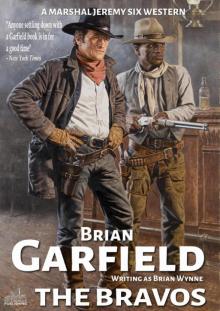 Marshal Jeremy Six #3
Marshal Jeremy Six #3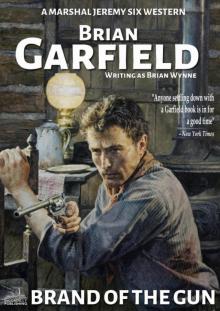 Marshal Jeremy Six #6
Marshal Jeremy Six #6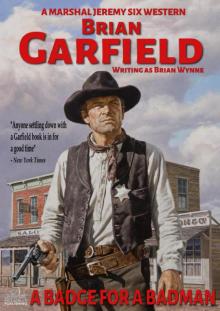 Marshal Jeremy Six #5
Marshal Jeremy Six #5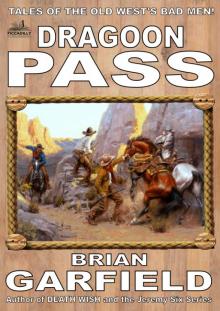 The Outlaws 2
The Outlaws 2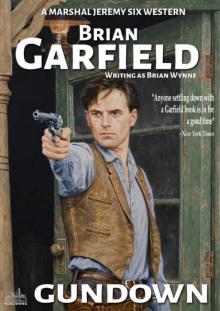 Marshal Jeremy Six #7
Marshal Jeremy Six #7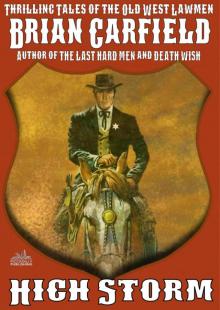 The Lawbringers 4
The Lawbringers 4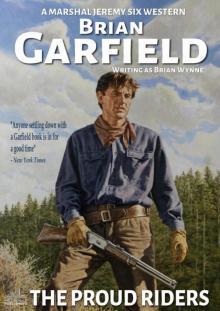 Marshal Jeremy Six #4 the Proud Riders
Marshal Jeremy Six #4 the Proud Riders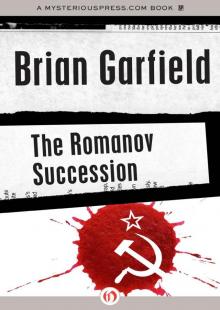 The Romanov succession
The Romanov succession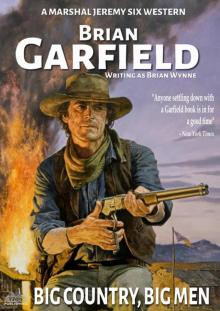 Marshal Jeremy Six #8
Marshal Jeremy Six #8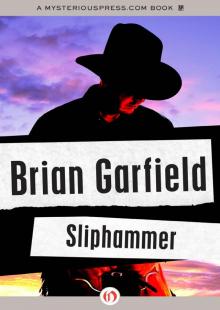 Sliphammer
Sliphammer Line of Succession
Line of Succession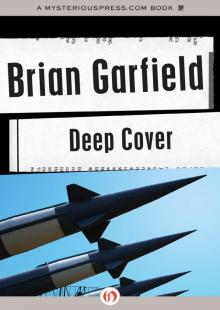 Deep Cover
Deep Cover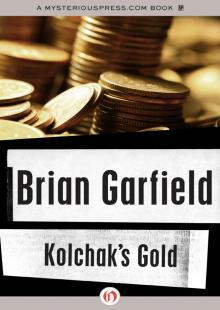 Kolchak's Gold
Kolchak's Gold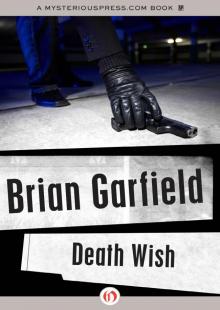 Death Wish
Death Wish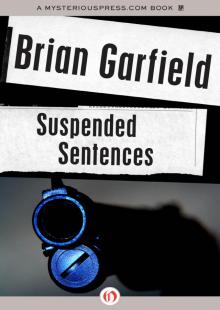 Suspended Sentences
Suspended Sentences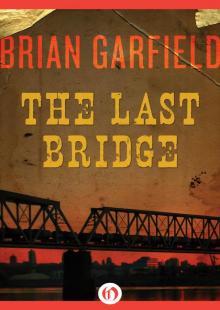 The Last Bridge
The Last Bridge Relentless
Relentless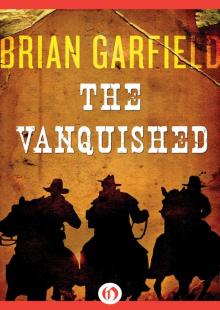 The Vanquished
The Vanquished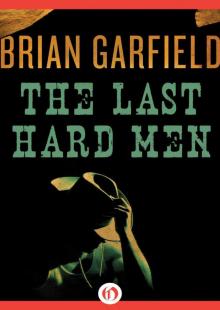 The Last Hard Men
The Last Hard Men Hit and The Marksman
Hit and The Marksman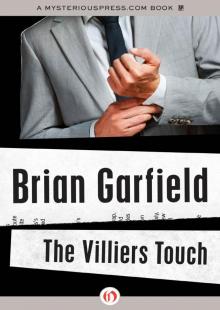 Villiers Touch
Villiers Touch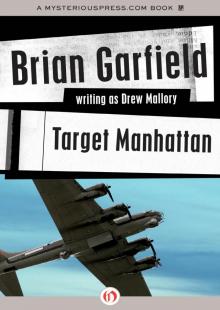 Target Manhattan
Target Manhattan Marchand Woman
Marchand Woman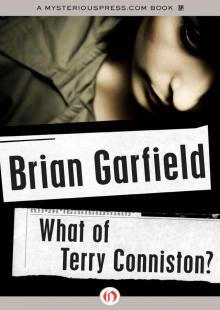 What of Terry Conniston?
What of Terry Conniston?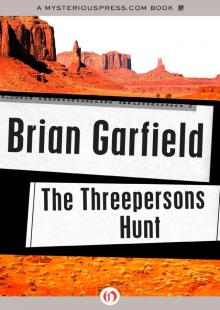 Threepersons Hunt
Threepersons Hunt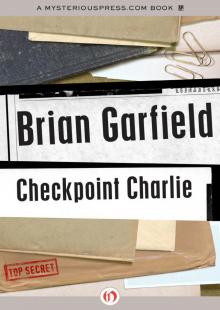 Checkpoint Charlie
Checkpoint Charlie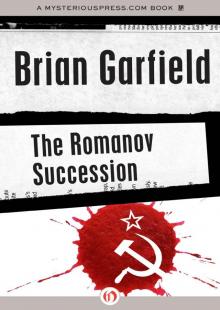 Romanov Succession
Romanov Succession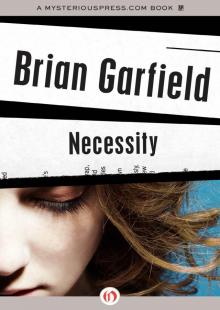 Necessity
Necessity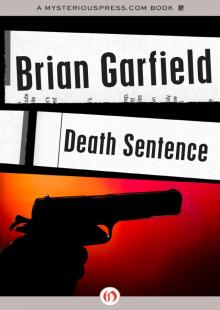 Death Sentence
Death Sentence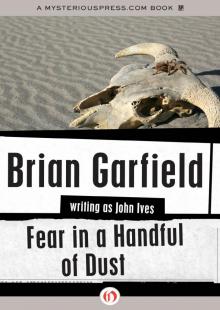 Fear in a Handful of Dust
Fear in a Handful of Dust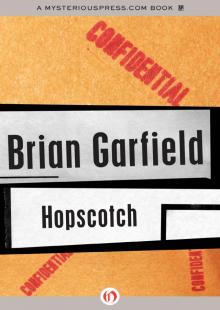 Hopscotch
Hopscotch